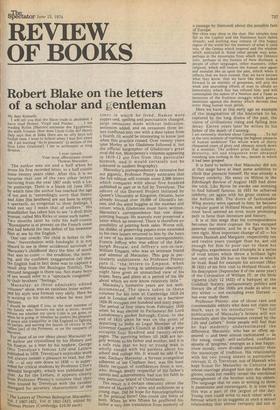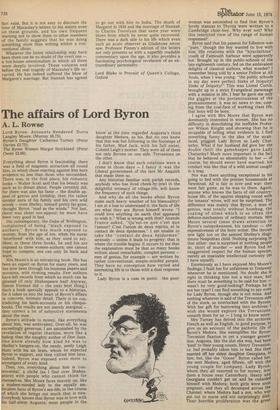Robert Blake on the letters of a scholar and Lentleman
My dear Kenneth,
I will tell you that the Slave trade is abolished. I have read Homer, Virgil and Pindar. . . . I am reading Rollin [Histoire ancienne des Egyptiens], the sixth Volume. How does Uncle Colin do? Henry Daly says that in India there are no silly boys nor
foolish ones. I went to School when I was five years old. I am learning "As in praesenti" [a section of the Eton Latin Grammar]. I am in arithmetic at long division.. . .
I ever remain
Your most affectionate cousin Thomas Macaulay. The author was six and a half when he wrote his first recorded letter, to a half cousin some twenty years older. After this it is no surprise that one of the two other letters surviving from the year 1807 ends with a Latin postscript. There is a blank till June 1811 by which time the author has reached the age of ten and is "exceedingly sorry that Henry and John [his brothers.] are not here to enjoy a spectacle, so congenial to their feelings, I need not say I mean that of soldiers." His grandfather has taken him to see "a droll little Woman, called Mrs Ricks or some such name." Two months later he tells his half-cousin "Buonaparte is at present on the French coast and had beheld the late defeat of his immense fleet at sea by the English."
One can overdo 'the child is father to the Man.' Nevertheless with hindsight it is not • absurd to see in these accidental survivals of Macaulay's childhood days the hint of much that was to come — the erudition, the learning, and the confident exaggeration (all that the English had in fact done was to capture a small ship from the Boulogne flotilla). The orotund language is there too. Not many boys of ten would refer to a "spectacle congenial" to their brothers' "feelings." Macaulay, as these admirably edited volumes* show, was an excellent letter writer, and his style was formed very early. Here he IS writing to his mother when he was just thirteen.
1 should be obliged if you, or the next member of the family who favours me with a letter, would inform me whether my uncle Colin is yet gone, or When he is going, or whether he prefers the pleasure 91 peace and tranquillity in Old England to fighting its battles, and earning the laurels of victory in the vallies [sic] of the Pyrenees, or on the ramparts of "Yonne. For most of us our ideas about Macaulay as Lan author are crystallised by his History and ins Essays, as a man by his nephew, George Otto Trevelyan's famous Life and Letters PUblished in 1876. Trevelyan's enjoyable work W, ill always remain a pleasure to read, but the Life — at any rate down to 1838 — is superseded for critical students by Professor Clive 's sPlendid biography, which was published last rtan As for the Letters, it appears clearly om Professor Pinney's volumes that they
disregard treated by Trevelyan with the cavalier 'sregard for accuracy characteristic of the times in which he lived. Names were suppressed, spelling and punctuation changed, large omissions made without indication, sentences added, and on occasions three letters conflated into one with a date taken from a fourth. (It would be interesting to know just when this practice ceased. Over twenty years later Morley in his Gladstone followed it, but the official biographer of Gladstone's great rival did not. Monypenny's volumes appearing in 1910-12 are free from this particular blemish, and it would certainly not be tolerated in modern biography). Macaulay's correspondence is extensive but not gigantic. Professor Pinney estimates that the full edition will contain some 2,500 letters which compares with about five hundred published in part or in full by Trevelyan. The editors of the Disraeli Project initiated by Queen's University at Kingston, Ontario, have already located over 10,000 of Disraeli's let ters, and the mind boggles at the number still extant which Gladstone must have written. Macaulay's correspondence has one disap pointing feature. He scarcely ever preserved a letter which he received. There is therefore no possibility of printing both sides. Worse still, his dislike of preserving papers even extended to his own letters returned to him by the heirs of two of his most important correspondents,
Francis Jeffrey who was editor of the Edinburgh Review, and Jeffrey's son-in-law, William Empson, who was an intimate friend and admirer of Macaulay. This gap is particularly unfortunate. As Professor Pinney'
puts it, "the letters to Empson, when Macaulay was living in ambitious obscurity, might have given an unmatched view of his hopes, fears and plans at a period of his life about which we now know relatively little." Macaulay's formative years are not welldocumented. The space taken in these volumes for his time at Cambridge 1818-24 and in London and on circuit as a barrister 1824-30 occupies one hundred and sixty pages. The period of four years from February 1830 when he was elected to Parliament for Lord Lansdowne's pocket borough, Caine, to the end of 1833 when he was on the point of departing to India as Legal Member of the Governor General's Council at £10,000 a year occupies four hundred and twenty-seven pages. The surviving letters till 1830 are largely written to his father and mother, and it is a safe rule that no boy or young man is wholly candid with his parents about his school and college life. It would be odd if he was. Zachary Macaulay, a fervent evangelical adherent of the Clapham Sect, was the least likely recipient of confidences from a son, who, though deeply respectful of his father's talents and achievements, had lost his faith in this particular brand of Christianity.
The result is a certain obscurity about the nature of Macaulay's aims and ambitions as a young man. Did he hope for historiographical or for political fame? One could cite hints of both. When he was fifteen he proffered his father a very free translation from memory of
a passage by Sismondi about the possible fate of Europe:
Her cities may sleep in the dust. Her temples may fall as the Capitol and the Pantheon have fallen already; and nothing may remain of this happy region of the world but the memory of what it once was, of the Genius which inspired and the wisdom which instructed it. Some other people may arise, perhaps in the mountains from which the Orinoco rolls, perhaps in the forests of New Holland, a people of other languages, other manners, other religions, which will restore the human race again and moralise like us upon the past, which when it reflects that we have existed, that we have known what they know, that we have like them looked forward to an eternity of greatness, will pity the weak and unavailing efforts of man to obtain an immortality which fate has refused him; and will contemplate the names of a Newton and a Tasso as instances of the fruitless struggle which genius maintains against the destiny which decrees that every thing human must perish.
Here we have at this early age an example of the imagination of the historian to be, captured by the long drama of the past, the vision of civilisations rising and falling into decay. Eleven years later he writes to his father of the death of Canning:
I am extremely shocked about Canning.. . . To fall at the very moment of reaching the highest pinnacle
of human ambition! The whole work of thirty chequered years of glory and obloquy struck down in a moment. The noblest prize that industry,
dexterity, wit and eloquence ever obtained vanishing into nothing in the vel, instant in which .it had been grasped.
It is hard to believe that Macaulay did not at this stage have at least some ambition to
climb that pinnacle himself. He was already a literary celebrity. His essay on Milton in the Edinburgh Review of August 1825 had done the trick. Like Byron he awoke one morning to find himself famous. In 1831 he achieved celebrity yet again with his great oration on the Reform Bill. The doors of fashionable Whig society were opened to him; he became a regular guest at Holland House, and politics must have seemed an even more promising path to fame than literature and history.
It is at this stage that his correspondence becomes far more copious. He has escaped paternal restraints, and he is a figure in his own right. Most important change of all — his sisters Hannah and Margaret, respectively ten and twelve years younger than he, are old enough for him to pour out to them his thoughts, experiences and triumphs in a series of vivid letters which throw a brilliant light not only on his life but on the times in which he lived. Read for example his account (May 30 1831) of his first visit to Holland House, or his description (September 9 of the same year) of the Coronation of William IV, or the little vignette (July 12 1832) of a banquet at the Guildhall. Society, parliamentary politics and literary life of the 1830s are made as alive as any writer — not excluding even Disraeli — has ever made them.
Professor Pinney, one of those rare and commendable editors who does not claim too much, says in his introduction: "The full publication of Macaulay's letters will not materially alter the impression created by the Life and Letters." Some people will feel that he has modestly underestimated the difference. Macaulay, who has so often appeared — and been almost caricatured — as the smug, tough, self-satisfied, confident apostle of 'progress,' emerges as a less happy, more moody, more divided personality than the stereotype of tradition. His relationship with his two young sisters is particularly relevant. G. 0. Trevelyan, son of Hannah who kept house for Macaulay in Calcutta and whose marriage plunged him into the darkest gloom, could not readily reveal the emotional entanglement of the brother with his sisters. The language that he uses in writing to them is passionate and extravagant. It is true that this was a part of the jargon of the day. Young men could write to each other with a fervour which to us suggests at once a sexual relationship that almost certainly did not in
fact exist. But it is not easy to discount the tone of Macaulay's letters to his sisters even on these grounds, and his own frequent warning not to show them to other members of the family suggests that he was doing something more than writing within a conventional idiom.
Whatever the latent relationship may have been there can be no doubt of the overt one — a hot-house emotionalism in which all three were deeply involved. These volumes end before the real tragedy of Macaulay's life occurred. He has indeed suffered the blow of Margaret's marriage. But Hannah has agreed to go out with him to India. The death of Margaret in 1834 and the marriage of Hannah to Charles Trevelyan that same year were blows from which he never quite recovered. There was a dark side to his life which even such an acute observer as Gladstone never saw. Professor Pinney's edition of the letters not only presents us with a superbly readable commentary upon the age, it also provides a fascinating psychological revelation of an extraordinary personality.
Lord Blake is Provost of Queen's College, Oxford



































 Previous page
Previous page